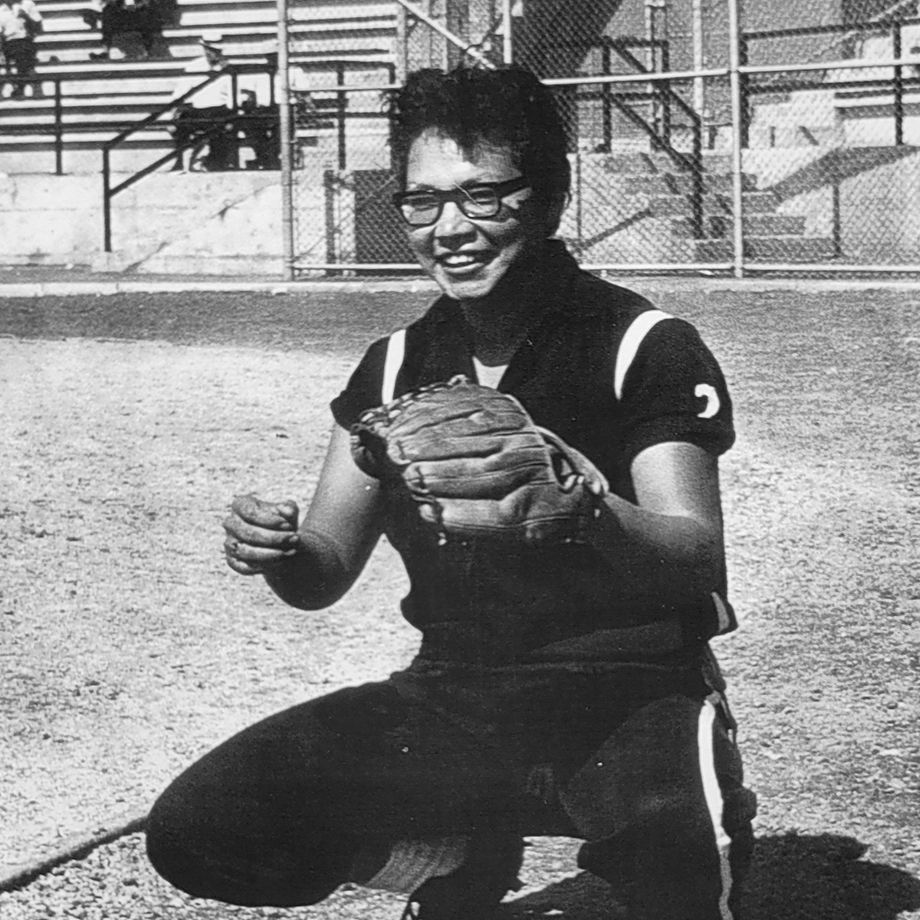Over a storied career spanning nearly a quarter century, Phyllis Bomberry pioneered her own revolutionary road to unparalleled excellence in Canadian softball. A Cayuga woman of the Wolf Clan, Phyllis was born in 1942 on the Six Nations of the Grand River in southwestern Ontario. Emerging as a star athlete in the 1950’s, she defied limiting postwar gender roles and a pervasive, sexist assumption that team sports were an inherently masculine domain. As an Indigenous girl growing up in the Residential School era, Phyllis faced additional magnitudes of racial discrimination that might have deterred a less committed athlete. Taking up ice hockey, football, volleyball, badminton and lacrosse at school, she manifested a fiery competitive drive at a young age that would see her through tremendous adversity in pursuit of her dreams.
Phyllis’ father played amateur baseball, and softball quickly became her chosen sport when she began catching pitches for her father and brother at the age of seven. Playing women’s intermediate softball with the Ohsweken Mohawks, Phyllis helped the team win back-to-back provincial Intermediate B championships in 1960 and 1961. After moving to Toronto to complete high school, she was quickly recruited to play catcher for the Carpetland Senior A Team in the Ontario Senior Women’s League. As a dedicated athlete, and in order to attend practices, Phyllis worked on an assembly line in a commercial radio factory, only to encounter open hostility as the only Indigenous woman playing on the team. Always within earshot of the stands at the catcher position, Phyllis repeatedly endured racist insults from spectators while teammates, coaches, and league officials did nothing to stand up for her. Negotiating unkindness on all sides with courage, dignity, and professionalism, Phyllis drew strength from the deep attachment she held to her community at Six Nations of the Grand River, and to her family, who often drove to Toronto to see her play.
Helping the Carpetland team win Canadian Softball Championships in 1967 and 1968, Phyllis Bomberry was named Top Batter, All-Star Catcher, and most valuable player (MVP) in 1967, and All-Star Catcher again in 1968. Breaking new ground, in 1968 Phyllis became the first female recipient of the Tom Longboat Award, established in 1951 to recognize outstanding Indigenous athletes in Canada. Her winning ways continued with a Gold medal performance at the first Canada Summer Games in 1969, where she was once again named Canadian All-Star Catcher and MVP. Resolutely committed to excellence, Phyllis continued playing softball at the highest level in Canada for many years, winning a Gold medal at the Ontario Summer Games in 1976 before a knee injury forced her retirement from competitive sport. Returning to the home she always held in her heart at Six Nations of the Grand River, she became an inspiration to young people and a respected craftsperson known for beautiful bead and leatherwork. Since she passed away in 2019, Phyllis Bomberry has received recognition as a trailblazing softball superstar whose story of resilience, grace, and grit is finally reclaiming the space it deserves in the history of Canadian sport.
Au cours d’une carrière légendaire s’étendant sur près d’un quart de siècle, Phyllis Bomberry a tracé sa propre voie révolutionnaire vers une excellence inégalée dans le softball canadien. Cayuga du Clan du Loup, Phyllis est née en 1942 dans la réserve des Six Nations de la rivière Grand, dans le sud-ouest de l’Ontario. Athlète vedette dès les années 1950, elle a défié les rôles de genre contraignants de l’époque de l’après-guerre et une supposition sexiste assez répandue selon laquelle les sports d’équipe étaient un domaine intrinsèquement masculin. En tant que jeune femme autochtone ayant grandi à l’époque des pensionnats, Phyllis a dû faire face à de la discrimination raciale d’une ampleur si grande qu’une athlète moins déterminée qu’elle aurait facilement pu être découragée de continuer. S’adonnant au hockey sur glace, au football, au volleyball, au badminton et à la crosse à l’école, elle a manifesté dès son plus jeune âge un esprit de compétition ardent, ce qui l’aiderait à surmonter d’énormes adversités dans la poursuite de ses rêves.
Son père jouait au baseball amateur, et le softball est rapidement devenu le sport de prédilection de Phyllis lorsqu’elle a commencé à attraper les lancers de son père et de son frère à l’âge de sept ans. Jouant au softball intermédiaire féminin avec les Ohsweken Mohawks, Phyllis a aidé l’équipe à remporter deux championnats provinciaux consécutifs en catégorie intermédiaire B en 1960 et 1961. Après avoir déménagé à Toronto pour compléter ses études secondaires, elle a rapidement été recrutée pour jouer comme receveuse de l’équipe senior A des Toronto Carpetland dans la Ligue des femmes seniors de l’Ontario. En tant qu’athlète dévouée, et afin de pouvoir assister aux entraînements, Phyllis a travaillé sur une chaîne de montage dans une usine de radios commerciales, pour ensuite faire face à une hostilité ouverte en tant que seule femme autochtone jouant dans l’équipe. Toujours à portée d’oreille des gradins de par sa position de receveuse, Phyllis a régulièrement enduré des insultes racistes de la part des spectateurs, tandis que ses coéquipières, entraîneurs et responsables de la ligue ne faisaient rien pour la défendre. Phyllis a su négocier l’hostilité dans son environnement avec courage, dignité et professionnalisme, en puisant sa force dans le profond attachement qu’elle avait pour sa communauté des Six Nations de la rivière Grand et pour sa famille, qui se rendait souvent à Toronto pour la voir jouer.
Contribuant à la victoire de l’équipe Carpetland aux Championnats canadiens de softball en 1967 et 1968, Phyllis Bomberry a été nommée meilleure frappeuse, receveuse étoile et joueuse la plus utile en 1967, ainsi que receveuse étoile à nouveau en 1968. Repoussant de nouvelles limites, Phyllis devient en 1968 la première femme à recevoir le prix Tom Longboat, créé en 1951 pour reconnaître les athlètes autochtones exceptionnels au Canada. Ses succès ont continué avec une médaille d’or aux premiers Jeux d’été du Canada en 1969, où elle a été à nouveau nommée receveuse étoile canadienne et joueuse la plus utile. Résolument engagée dans l’excellence, Phyllis a continué à jouer au softball au plus haut niveau au Canada pendant de nombreuses années, remportant une médaille d’or aux Jeux d’été de l’Ontario en 1976 avant qu’une blessure au genou ne la force à prendre sa retraite du sport compétitif. C’est alors qu’elle revient au domicile qu’elle a toujours eu dans son cœur, aux Six Nations de la rivière Grand, où elle devient une source d’inspiration pour les jeunes et une artisane respectée, reconnue pour son magnifique travail des perles et du cuir. Depuis son décès en 2019, Phyllis Bomberry a été reconnue en tant que superstar et pionnière du softball, dont l’histoire de résilience, de grâce et de détermination occupe enfin la place qu’elle mérite dans l’histoire du sport canadien.



